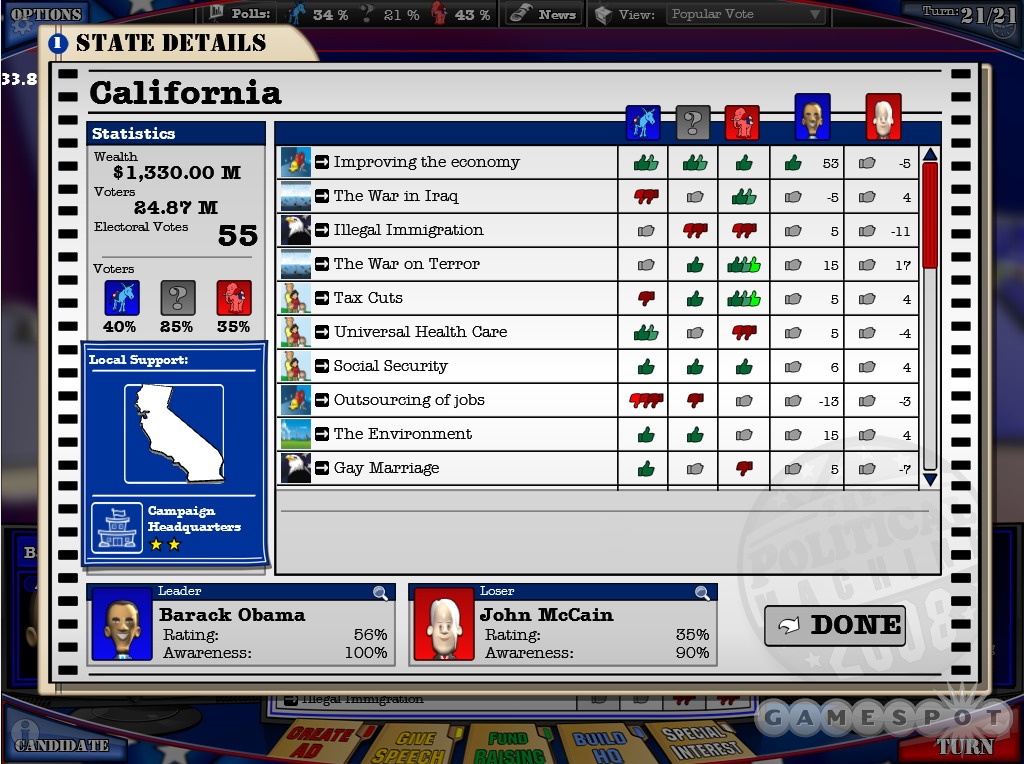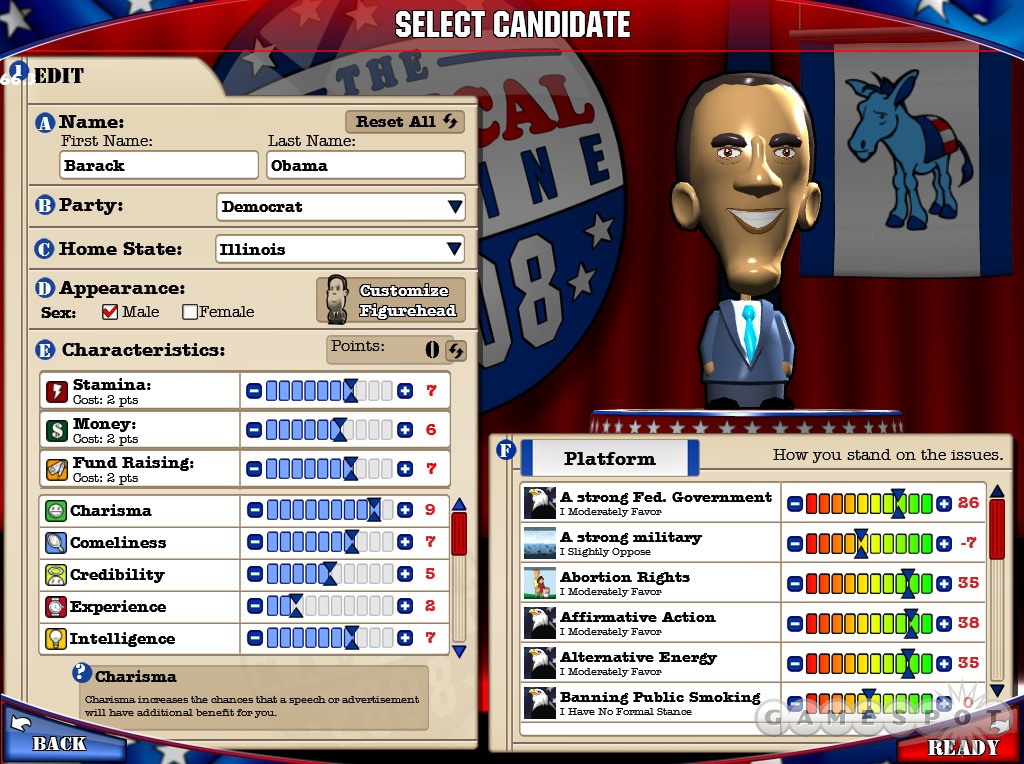The Political Machine 2008 Q&A: Tackling the Issues
The election simulation and satire is back in 2008. Who wins?
The Political Machine was a tongue-in-cheek look at North American politics released just in time for the 2004 presidential election. Using John Kerry, George W. Bush, or any number of fantasy candidates such as Ulysses S. Grant, you didn't simply tackle the issues; using spin doctors, PR machines, celebrity endorsements, and negative advertising, you ran right over them. Now The Political Machine is back, revised for 2008 with a new list of issues, a new list of candidates, and some pleasant surprises, like the 1860 election, which was informed by slavery and the Civil War. For the latest on The Political Machine 2008, we sat down with Brad Wardell, the lead designer as well as the president and CEO of Stardock Corp. Here's what he had to say (and mud in your eye).
GameSpot: The 2004 election was intense, to be sure, but nothing in American history rivals what we've seen in 2008 in terms of media coverage, political trickery, and outright passion. Have you intensified the action in The Political Machine 2008 to capture such a charged political climate?
Brad Wardell: Definitely. Players can bring in spin doctors, smear merchants, media consultants, fixers, and more to help get themselves elected. We've created a custom candidate maker, scenarios, better multiplayer, more operatives, etc.
GS: In addition to creating your own candidate, which real-life candidates will we see? You also had a great cast of fictional candidates in 2004, including Arnold Schwarzenegger. Is there any chance of an unlockable Al Gore, John Kerry, or Bob Dole?
BW: Absolutely. One of the nice things about a game like this is that it lets us do some fun things with the release. For instance, as the political season heats up this summer and fall, we'll be releasing free candidates up on PoliticalMachine.com for users to download and add in. The game comes with most of the big names, either as default or unlockable, but we plan to continue to add more and more as the election nears.
GS: Any candidate-specific special attacks in the Machine? A Hilary "crying button"? A McCain war-story dialog tree? Huckabee dancing minigame?
BW: Haha. No, we have tried to stay away from anything that might give the impression that the game is rooting for any particular candidate.
GS: Certainly many of the issues in 2004 have changed, while many have sadly remained the same. What are the hot-button topics candidates will touch on this election, and what are some of the best strategies for handling them?
BW: There are some interesting topics that have come up this time. You still have the war in Iraq, and the economy is right at the top too. But this time we have things like alternative fuels being a hot topic, as well as freezing mortgage rates and other things in which the political parties differ on.
One of the biggest changes is that we have scenarios. So we not only have the 2008 US election, but we include a Civil War scenario with the issues from 1860. We also include "Europa," which is Europe as seen by a typical American tourist (i.e., highly politically incorrect satire); "Germania," "that little country by Poland"; "Australia" (as opposed to Austria), with the issues being, well, let's just say not accurate.
And of course, this time you can finally run for Emperor of the Drengin Empire. Are you pro slavery or pro genocide? These are the tough issues that Drengi politicians have to deal with.
GS: Aside from the issues, The Political Machine was a great satire on political media coverage, featuring fiery talk-show hosts and endorsements from celebrities. How have you updated this for 2008?
BW: Big time. This time we have a satire on the Colbert Report. It's a big upgrade.
GS: One issue we had with the original game is that the AI candidates didn't always focus on the most important states. Tell us how you've updated the AI and some of the different political strategies we'll see from them.
BW: This is one of those things where time helps. We've had a lot more time to focus on the computer AI to master the strategy. When I program computer AI, I'm playing the game and learning the game, and then incorporate those strategies into the computer players. When we did the 2004 edition, I hadn't had much time to play the game, so my strategies weren't as far along as they are now.
GS: The 2004 edition was somewhat of a crystal ball in that it predicted 48 of the 50 states, and also George W. Bush to defeat John Kerry. What factors are you looking at, and why do think the game predicted the outcome so accurately?

BW: For the most part, it's all about demographics and issues. The election is really decided by issues and turnout. It's not as sexy as the media might like it to be, but at the end of the day, it's really just about a) getting your base out to vote, and b) getting independents to care about an issue that makes you different from your opponent. Last time, the game got every state right except for Ohio and I think Iowa (and that was in June of 2004, prior to the Swift Boat advocacy).
This time it's a lot more complicated because the candidates are not quite as different as they were in 2004. McCain has a number of atypical positions for a Republican. There is also a significant difference in financial resources between the parties this time. On the other hand, Obama has weaker demographic support in key electoral states like Ohio and Pennsylvania, which the Democrats have to win.
GS: We haven't seen many blue states go red in the general election, or vice versa. How can a candidate like Obama win Texas? Is it even possible?
BW: In The Political Machine, anything's possible. In the real world, candidates play as true experts. But in The Political Machine, players can do gambits that just would never happen in the real world. For instance, with enough spin doctors, advertisements, and other operatives, I've won California with McCain, which is certainly not going to happen in November.
GS: Thanks for your time.
Got a news tip or want to contact us directly? Email news@gamespot.com

Join the conversation